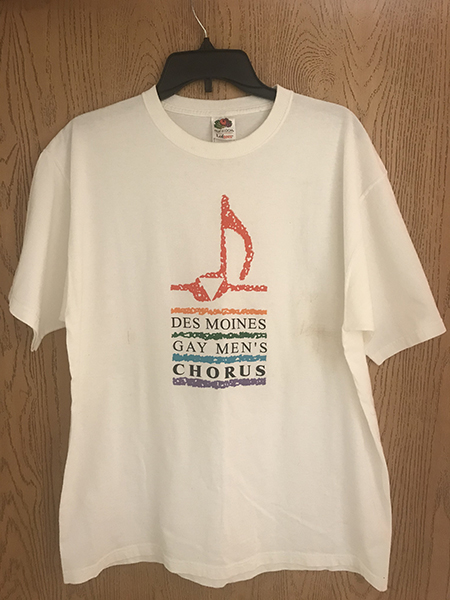Des Moines Gay Men’s Chorus, Queer Spaces, Collectives Styles, and Activist Dress, 1984 to the Present
October 1, 2021 – March 2022 / MARY ALICE GALLERY
During the 1970s, people in the United States founded gay and lesbian choruses for political activism, coming out, and celebration. In 1984, John Schmaker founded the Des Moines Men’s Chorus (DMMC) in his basement, then a small group of about eight to ten members. The word “gay” was excluded from the original chorus’ name because of significant homophobia in Iowa during the early 1980s, especially amidst the AIDS epidemic when President Reagan refused to speak publicly about the public health crisis that disproportionality impacted gay and bisexual men. There was much concern over backlash against group members. In 1991, the DMMC lost its director and could not find another, resulting in a ten-year hiatus. In 2001, the group chose a new leader, Dr. Randal Buikema, to direct and conduct. Along with this change, the group rechristened itself as the Des Moines Gay Men’s Chorus (DMGMC). With the inclusion of “gay” in its new name, the ensemble signaled pride in an overt queer identity. In this mini-exhibition, we examine how the DMGMC members fashioned and styled themselves during various performances, and consider how gay men’s chorus members navigate entanglements of tradition, gayness, and music while also reclaiming oppressive symbology.
DMGMC members perform three concerts per year, selecting music that reflects the organization’s values and goals. One is a formal solstice concert held in December, and another is a formal spring concert held in March. For these concerts, members almost exclusively wear tuxedos for the entire performance, but some choose to accessorize with rhinestones or glitter, reflecting feminine-leaning aesthetics adopted by some gay men.
The chorus’ cabaret-style concert began in 2009 and they now occur every June as a celebration of Pride Month. In contrast to the other two main concerts, the cabaret show is an opportunity for the chorus to “let their hair down” and “to do something a little bit naughtier, a little bit riskier, a little bit off the choral path that is not your Bach or your Andrew Lippa” (Paul Hengesteg, DMGMC member since 2011). For these performances, chorus members wear various campy outfits such as a nun’s habit or kink styles, such as harnesses.
In addition to the three main concerts they perform each year, the chorus also performs at nonrecurring engagements such as funerals, weddings, festivals, and other events, which are not limited to the Des Moines metro area. Many of these public engagements emphasize activism, and some, like Pride events, specifically focus on queerness. For these, members wear overtly activist fashions, such as slogan T-shirts.

Schmaker’s founding of the DMGMC precipitated the creation of a vibrant gay men’s community space in the Midwest, and the group evolved amidst changes to the social and political landscape for queer Midwesterners. They negotiated queer sensibilities, the choral tradition, activism, politics, and community building through their T-shirts and performance costumes in complex ways. The DMGMC produced, distributed, and consumed queer representations as it created a temporary queer space during the AIDS crisis, highlighting how community formation and visibility have been—and continue to be–significant in the history of gay America.
Curators
Isaiah Sents, undergraduate student, Apparel, Merchandising and Design
Kelly L. Reddy-Best, associate professor, Apparel, Merchandising and Design and director and curator, Iowa State University Textiles and Clothing Museum
Kyra G. Streck, masters student, Apparel, Merchandising and Design and Agatha Huepenbecker Burnet endowed graduate research and teaching assistant